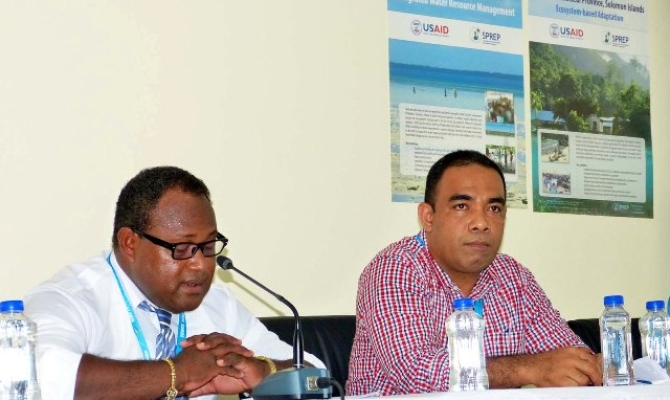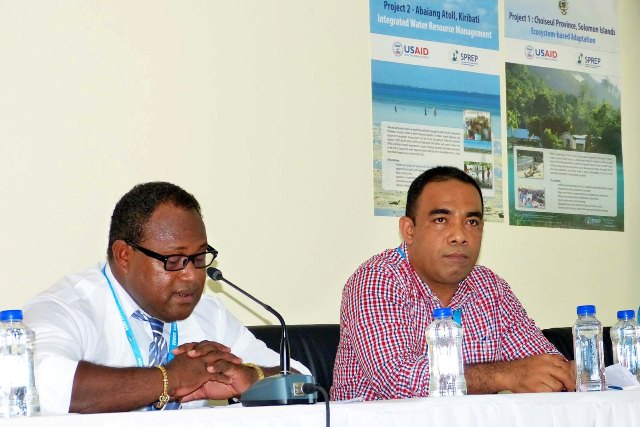
Island and Ocean Ecosystems
1 September 2014, Apia, Samoa - The Deputy Prime Minister of the Solomon Islands, Hon. Manasseh Maelanga, stood in front his audience at the 2014 SIDS conference to address an issue that can impact upon many developing countries.
The Deputy Prime Minister showed his obvious pride when he spoke of a partnership that is "a bold step away from the usual approach" and "a success story in its own right".

The generosity of modern development assistance means that many projects can be taking place at the same time and often working in the same sector without coordinating their approaches. Efforts can be duplicated and there can be competition between projects for government counterparts, assistance and resources.
Now the Solomon Islands Government is leading the way by utilising an integrated partnership approach that minimises these issues. The Government selected Choiseul Province in the Western Solomon Islands as the place to bring together many projects under what has become the Choiseul Integrated Climate Change Programme (CHICCHAP).
The Deputy Prime Minister highlighted that without this type of partnership, "agencies will lend themselves to working separately, and in isolation".
The list of partners is growing. It started with only 3 organisations and now includes several Solomon Islands Government ministries, Lauru Land Conference of Tribal Communities (LLCTC), Secretariat of the Pacific Regional Environment Programme (SPREP),, Secretariat of the Pacific Community (SPC), Deutsche Gesellschaft für Internationale Zusammenarbeit (GIZ), Australian Department of Foreign Affairs and Trade (DFAT), The Nature Conservancy (TNC), and the United Nations Development Programme (UNDP).
 An Ecosystem-based Adaptation Project in Choiseul,
An Ecosystem-based Adaptation Project in Choiseul,
implemented by SPREP and funded by USAID is part of the partnership.
"CHICCHAP has already proven to be a viable approach to addressing climate change in the Solomon Islands. Two other provinces, Makira and Malaita, have now approached our Ministry of Environment, Climate Change, Disaster Management and Meteorology so they can have similar programmes" said the Deputy Prime Minister.
The partners now have 11 projects working in coordination for the benefit of Choiseul Province. The Partners Advisory Group (PAIG), which comprises national ministries and development partners, is responsible for coordinating inputs into CHICCHAP. The projects have a joint implementation plan and share financial, human and technical resources amongst themselves. Sharing amongst partners also means finances saved are utilised where they are needed the most: for communities on the ground in Choiseul Province.
Additionally, the Solomon Islands Government can hold one PAIG meeting and coordinate all the partnership projects. The communities of Choiseul can attend one consultation instead of 11. The burden of management and the fatigue of over-consultation on similar topics is avoided.
Coordinating projects working across multiple sectors allows for a comprehensive 'whole of island' approach, where individual programs can link their work from "ridge-to-community-to-reef". This ensures that the work they are doing is complimentary and benefits the communities and environment of Choiseul as a whole.
"Within the programme are various approaches to adaption: agroforestry, ecosystem-based adaptation, local managed marine areas, contour farming, education mangrove and coastal rehabilitation, biodiversity conservation and engagement of youths in community development" said the Deputy Prime Minister.
As the overarching theme of SIDS 2014 is "The sustainable development of Small Island Developing States through genuine and durable partnerships", many at the conference are hoping that this example from the Solomon Islands can be also used elsewhere to ensure better outcomes for all.
The Choiseul Integrated Climate Change Programme event took place on Monday 1 September at the UNSIDS Conference Venue.
The Deputy Prime Minister showed his obvious pride when he spoke of a partnership that is "a bold step away from the usual approach" and "a success story in its own right".

L - R: Deputy Prime Minister of the Solomon Islands, Hon. Manasseh Maelanga and
Dr. Melchior Mataki Permanent Secretary Minitsry of Environment, Climate Change, Disaster and Meteorology, Solomon Islands. Photo: Carlo Iacovino/SPREP
Dr. Melchior Mataki Permanent Secretary Minitsry of Environment, Climate Change, Disaster and Meteorology, Solomon Islands. Photo: Carlo Iacovino/SPREP
The generosity of modern development assistance means that many projects can be taking place at the same time and often working in the same sector without coordinating their approaches. Efforts can be duplicated and there can be competition between projects for government counterparts, assistance and resources.
Now the Solomon Islands Government is leading the way by utilising an integrated partnership approach that minimises these issues. The Government selected Choiseul Province in the Western Solomon Islands as the place to bring together many projects under what has become the Choiseul Integrated Climate Change Programme (CHICCHAP).
The Deputy Prime Minister highlighted that without this type of partnership, "agencies will lend themselves to working separately, and in isolation".
The list of partners is growing. It started with only 3 organisations and now includes several Solomon Islands Government ministries, Lauru Land Conference of Tribal Communities (LLCTC), Secretariat of the Pacific Regional Environment Programme (SPREP),, Secretariat of the Pacific Community (SPC), Deutsche Gesellschaft für Internationale Zusammenarbeit (GIZ), Australian Department of Foreign Affairs and Trade (DFAT), The Nature Conservancy (TNC), and the United Nations Development Programme (UNDP).
 An Ecosystem-based Adaptation Project in Choiseul,
An Ecosystem-based Adaptation Project in Choiseul, implemented by SPREP and funded by USAID is part of the partnership.
"CHICCHAP has already proven to be a viable approach to addressing climate change in the Solomon Islands. Two other provinces, Makira and Malaita, have now approached our Ministry of Environment, Climate Change, Disaster Management and Meteorology so they can have similar programmes" said the Deputy Prime Minister.
The partners now have 11 projects working in coordination for the benefit of Choiseul Province. The Partners Advisory Group (PAIG), which comprises national ministries and development partners, is responsible for coordinating inputs into CHICCHAP. The projects have a joint implementation plan and share financial, human and technical resources amongst themselves. Sharing amongst partners also means finances saved are utilised where they are needed the most: for communities on the ground in Choiseul Province.
Additionally, the Solomon Islands Government can hold one PAIG meeting and coordinate all the partnership projects. The communities of Choiseul can attend one consultation instead of 11. The burden of management and the fatigue of over-consultation on similar topics is avoided.
Coordinating projects working across multiple sectors allows for a comprehensive 'whole of island' approach, where individual programs can link their work from "ridge-to-community-to-reef". This ensures that the work they are doing is complimentary and benefits the communities and environment of Choiseul as a whole.
"Within the programme are various approaches to adaption: agroforestry, ecosystem-based adaptation, local managed marine areas, contour farming, education mangrove and coastal rehabilitation, biodiversity conservation and engagement of youths in community development" said the Deputy Prime Minister.
As the overarching theme of SIDS 2014 is "The sustainable development of Small Island Developing States through genuine and durable partnerships", many at the conference are hoping that this example from the Solomon Islands can be also used elsewhere to ensure better outcomes for all.
The Choiseul Integrated Climate Change Programme event took place on Monday 1 September at the UNSIDS Conference Venue.